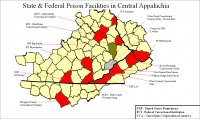Prisons won't unlock prosperity in E. Ky.

U.S. Rep. Harold "Hal" Rogers recently announced major progress for efforts to bring a new maximum-security federal prison to Letcher County, one of the many Eastern Kentucky counties hard hit by the declining coal industry.
The Federal Bureau of Prisons awarded a contract to conduct an environmental impact study on two selected sites. But even as that process moves forward, no funding has yet been allocated for construction of the proposed $250 million to $350 million project.
If built, this will be the fourth new federal prison to come to Eastern Kentucky, and the sixth federal prison built in Central Appalachia, since 1992 — in addition to new state and private prisons. Indeed, in the last quarter-century of skyrocketing incarceration, Central Appalachia has become one of the most concentrated areas of prison growth in the country.
Each prison came with the promise of hundreds of jobs and broad-scale economic growth. So as Letcher County waits, we should ask, what happened in these other prison-host communities. Did the promises come true?
McCreary County, where a federal prison opened in 2004, provides one example.
In 1990, McCreary County had the lowest per capita income in the state, and a staggering 45 percent of the population was living below the poverty line. So when rumors began to circulate that a new prison might be coming to town, it was welcome news. "At that particular time it was the biggest thing, it was like Santa Claus has come," said Jimmie Greene, who was then McCreary County judge-executive. "He's given us a gift that we didn't expect, didn't know anything about. And I was just overjoyed."
Officials were told the prison would have an operating annual budget of $25 million, with 80 percent of the money spent locally, and that it would bring hundreds of jobs. So the county rolled out the red carpet to ensure the prison's arrival — running new sewer lines, paving roads, building a whole new water treatment plant.
But it wasn't until 2001 — a year into the prison's construction — that the qualifications needed for getting a prison job became apparent. All applicants would be drug-tested and background checked, need a clean credit history and no prior criminal record, have to pass a rigorous physical exam and be younger than 38. County residents would be given no preference in the hiring process, and a four-year college degree and previous institutional experience were "highly recommended."
As Blaine Phillips, who succeeded Greene as McCreary judge-executive, recounted in 2009, "Of the 300 and something employees that work at the prison, I don't think we have over 25 or 30 local people that are working there," he said. "It was not what they were telling us at first."
Transferring employees filled the vast majority of positions and most chose to live in nearby cities outside the county. They did not buy local real estate, shop at local businesses or put their children in county schools. The prison purchases supplies from national wholesalers, not local businesses. And the county's property tax base was permanently reduced when the prison land transferred from private ownership to the federal government.
It's been almost a decade since the prison opened in McCreary County, and it remains one of the poorest counties in one of our nation's poorest congressional districts. The situation is so dire the school board is facing a $1 million shortfall in the upcoming year, and one proposal is to cut kindergarten to a half-day.
Clay and Martin counties, where federal prisons opened in 1992 and 2003, also rank among the 10 poorest counties in the state.
Kentucky's experience is not unique. One 2010 study analyzed data on every rural county in the country from 1969 to 2004 and found no evidence that prison construction leads to economic growth, and furthermore that the poorest counties are the most likely to have a net loss from prison construction.
Prisons do not bring prosperity to the communities that host them. And in addition to failing the struggling regions where they are built, we must also ask, why prisons are being offered as a tool for rural economic development in the first place. Why should the federal government spend $300 million to build another one?
Eastern Kentucky needs real investment, in its schools, its small businesses, its people. It doesn't need another prison.
Originally published in the Herald-Leader, April 28, 2013
Sylvia Ryerson of Letcher County is a journalist for WMMT 88.7 Mountain Community Radio, a project of Appalshop.
Recent News
Kentucky’s past legislative session showed alarming trend toward government secrecy
Churchill Downs takes more than it gives. That's why the Kentucky Derby is a no-go for me
‘We must never forget.’ Kentucky town installs markers for lynching victims.
Featured Posts
TJC Rolling Out The Vote Tour – a KFTC Reflection Essay
KFTC Voter Empowerment Contractor Reflection Essay
Voting is Power
Archives
- Home
- |
- Sitemap
- |
- Get Involved
- |
- Privacy Policy
- |
- Press
- |
- About
- |
- Bill Tracker
- |
- Contact
- |
- Links
- |
- RSS


Add new comment